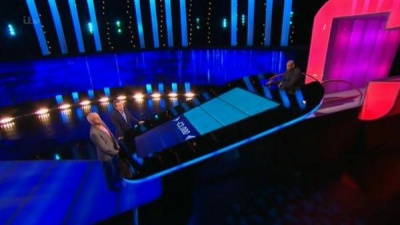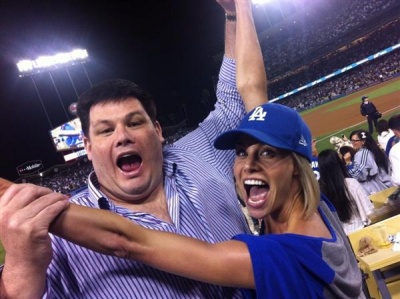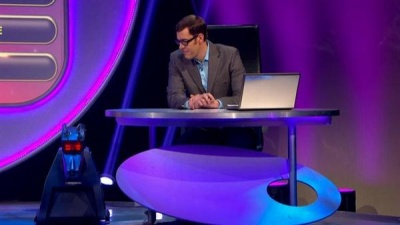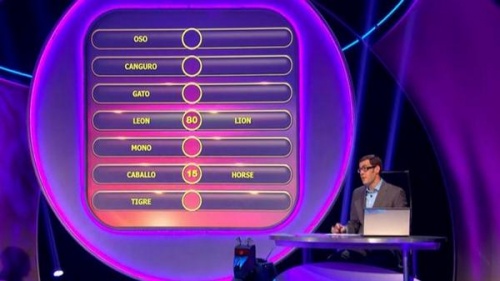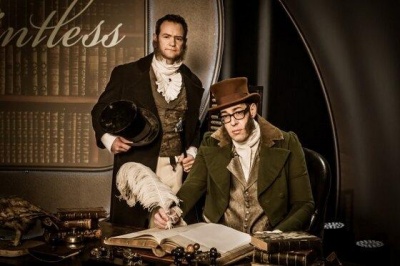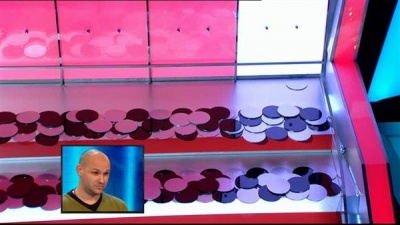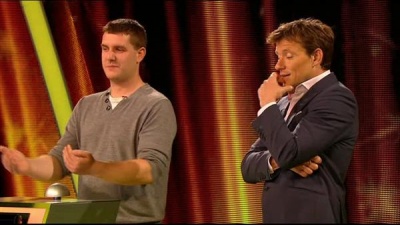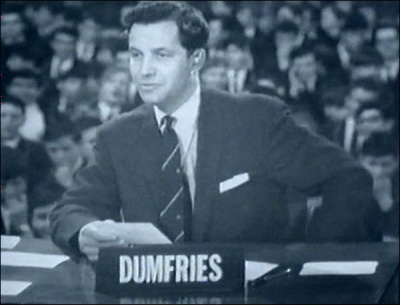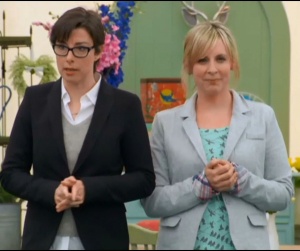Weaver's Week 2014-01-12
(Created page with 'The Week of the Year | Weaver's Week Index | Next week It's democracy season! Lines are now open for …') |
(→This Week and Next: some important qualifiers) |
||
| Line 103: | Line 103: | ||
'''[[University Challenge]]''' picked up where it left off, with the (er) last second-round match. Well, not ''quite'' where it left off: the captions and nameplates beneath the teams are in a mixture of two typefaces, and not a spectacularly ugly composition that's going to annoy the heck out of us all next series. This match was between Reading, who we saw beating St John's Cambridge while watching for news of Prince George; and the School of African and Oriental Studies (SOAS), who beat Southampton at a canter four weeks later. And Southampton have come through the back door into the last eight. | '''[[University Challenge]]''' picked up where it left off, with the (er) last second-round match. Well, not ''quite'' where it left off: the captions and nameplates beneath the teams are in a mixture of two typefaces, and not a spectacularly ugly composition that's going to annoy the heck out of us all next series. This match was between Reading, who we saw beating St John's Cambridge while watching for news of Prince George; and the School of African and Oriental Studies (SOAS), who beat Southampton at a canter four weeks later. And Southampton have come through the back door into the last eight. | ||
| - | SOAS got the first few starters, but failed to recall that 1729 is the smallest positive integer that can be expressed as the sum of two cubes. It's not "the smallest number of no interest", because such a number would, itself, be interesting. The first visual round was a mess: given lists of sportsmen, the UC contenders are to give the year, event, and competing nations. Four pieces of information for five points was long. A set on buzzwords of 2012 just felt old now; that's ''so'' the year before last. | + | SOAS got the first few starters, but failed to recall that 1729 is the smallest positive integer that can be expressed as the sum of two positive cubes in two different ways. It's not "the smallest number of no interest", because such a number would, itself, be interesting. The first visual round was a mess: given lists of sportsmen, the UC contenders are to give the year, event, and competing nations. Four pieces of information for five points was long. A set on buzzwords of 2012 just felt old now; that's ''so'' the year before last. |
We slightly misheard one of the answers: it was Baron Munchausen (a character known for long and incredible tales) and not Barry Manilow (a character known for long and incredible noises). By this time, SOAS had opened up a gap of more than 100 points, and it only got wider, even though they thought an anagram of "Geneva" was "Vengeance". Reading made a slight comeback, finishing with 9/15 bonuses, but SOAS were better on the buzzers, captain Peter McKean scoring 8 starters. The final score of 240-90 was a fair reflection of the game. | We slightly misheard one of the answers: it was Baron Munchausen (a character known for long and incredible tales) and not Barry Manilow (a character known for long and incredible noises). By this time, SOAS had opened up a gap of more than 100 points, and it only got wider, even though they thought an anagram of "Geneva" was "Vengeance". Reading made a slight comeback, finishing with 9/15 bonuses, but SOAS were better on the buzzers, captain Peter McKean scoring 8 starters. The final score of 240-90 was a fair reflection of the game. | ||
Current revision as of 11:08, 12 January 2014
The Week of the Year | Weaver's Week Index | Next week
It's democracy season! Lines are now open for the UKGameshows Poll of the Year 2013, run in partnership with Bother's Bar. But do be swift, because the active voting window will slam shut on Wednesday night, and we don't want you to be left out in the cold.
There's one bit of the Review of the Year we left out. Partly because it was turning out a bit long for a snappy review, but mostly because there was nothing else we could properly write about this week. So, without further ado, we present:
Seven Teatime Friends
That's Mark, Shaun, Anne and Paul from The Chase, Richard and Xander from Pointless, and The Machine from Tipping Point. All three of these programmes placed in their respective channel's top 30, beating some primetime programmes. All three have built up a substantial cult following. Yes, we've looked at all three before (see the Weeks of 12 July and 20 September 2009, and 22 July 2012), all three deserve another look.
The Chase has the dubious honour of going first. It's a battle between four quizzing Davids and one Goliath. Members of the public choose whether to play an easy, medium, or difficult game (for small, reasonable, or colossal rewards) hoping to compete in the final chase, and then earn an equal share of the team's prize.
As we've seen on ITV, the gameplay is theatre of the familiar. A one-minute speed round, a brief discussion to decide on the difficulty of the main game, and then the chase proper. Multiple-choice questions, usually mixing up easy and difficult so the player makes some progress without ever being assured of the win. And repeat that four times.
Some things can quickly be seen. Bradley Walsh is capable of cranking out the questions at a rate of knots. Kaye Adams asked to "quiz me quick" in this slot a decade ago; Bradley is able to ask ten, perhaps eleven questions a minute throughout the show. Other shows in this area – Eggheads, for instance – might get through ten questions in a quarter-hour. After the frenetic start, the pace slows a little while the contender considers the offer, then slowly ratchets up as the round progresses.
Other things take longer to come out. We noted in 2009 that both original Chasers – Mark Labbett and Shaun Wallace – were interesting characters. The duo have been joined by Anne Hegerty and Paul Sinha, both supreme quizzers, both characters in their own rights. The producers have allowed all four to bring out their characters, turning them into pantomime villains – figuratively in the main, literally for the Text Santa specials. There are nicknames to assist the new viewer: The Beast, the Dark Destroyer, the Governess, and the Sinnerman.
There might have been a plan to turn The Chasers into characters. Bradley's penchant for collapsing into laughter was known two decades ago, it doesn't stop the producers from planting something that might trip him up. Just once in a while. Well, once in most shows. "Where is the town of Middelfart?" asked one query this week. "Snicker," thought the producers.
But these are little in-jokes, they enhance the main programme. The format ends with the Final Chase, which is almost guaranteed to give a very tight finish. On a good day, it'll still be competitive with ten seconds of play remaining, and we get a good day about once per week. Every day, the Chaser will be gracious in defeat and magnanimous in victory – these four are almost the definition of "good sports".
The Chase has now had three series in primetime, and it's gone international, with versions in Russia and Germany, as well as the North American market. There, they've decided to borrow one of the UK's best brains, and invited Mark Labbett to reprise his role.
In 2009, we asked after the first two weeks of The Chase, "Does it have the cult potential of Blockbusters? Here, we're going to stick our neck out and answer in the affirmative."
Pointless began some weeks later, and it's almost unrecognisable from the show we now know. Five contestants? Introductions that go on a bit? Three opening rounds that are all the same? A frankly bizarre head-to-head final? All of these elements have evolved out.
There aren't many constants, but the Pointless Column, of discs flying off a scoring bar while the audience goes "oooooOOOOOOH!" is one of them. Even the hosts have changed: where once the programme was Alexander Armstrong and his sidekick Richard Osman, it's now Alexander Armstrong and Richard Osman, effectively co-hosting the show. Xander (as he's usually called) still leads the conversation with the day's contestant pairs, but rather than doing it all in one block at the beginning, the chatter is spread out through the first round.
The questions have evolved, from straightforward lists like "name an African country" to more complex lists, like "name a British entry to the Eurovision Song Contest". The latter gave proof, if proof were needed, that "Bye bye baby" (Jemini, 2003) was a Pointless endeavour, adding £250 to the prize fund.
But such lists are now quite rare. More often, the players will have to decode clues, like work out which animals are being described in foreign names, or the plot points of some movies. Or they'll be given pictures to identify, words and titles with alternate letters missing, or the length of the words in the answer – such as "Beatles hit (3, 5, 3)". We've not yet seen them give clues in the style of cryptic crosswords (and if the idea stems from this article, a donation to the 2500 Clue Challenge would be satisfactory). Even the endgame has undergone revision, with contenders given three related but very obscure lists and asked to find an answer from within them.
Perhaps the biggest change is that Pointless has decided whether it wants to be a straight quiz, or an entertainment. We found the early series to fall in the unhappy place between the two: too slow to be intellectually demanding, too dry to be properly amusing. By reducing the number of teams from five to four, the pace has slowed, and there's proper conversation between the hosts and contestants.
In particular, Richard has been allowed to develop a character, get some catchphrases of his own. Xander has "Is it right, and how many people said it?", Richard has the snappier "And by country, we mean an independent sovereign state that's a member of the United Nations in its own right." And both hosts will regularly raid the dressing-up box, turning up in costumes and bringing their pets to the studio.
That's the heart of Pointless: it works as a gentle little quiz, dressed up in a "you know stuff that the average person doesn't, and here's how you measure it." And it works as an entertainment where viewers can just sit back and enjoy the ride. We said in 2009 that Pointless could work "as a piece of Saturday teatime filler {in the slot} currently occupied by Celebrity Weakest Link." The aptly named Pointless Celebrities took to primetime in late 2011, and it's been a regular in the early evening slot between Final Score and Dr Who.
The attraction of Tipping Point is more obvious: a great big machine, with two shelves, one fixed and one that goes forwards and back, and counters that are dropped into that mechanism. Ben Shepherd is the host, the machine's trusted lieutenant. He invites the players to put their counters in, and commentates on the drop.
Like the other shows, Tipping Point has quickly made some catchphrases of its own. All of these catchphrases are natural ones, they've evolved from things that might be said in the natural course of play. "Ooh, that's a fast drop." "Aaah, it's a rider!" "A bit of lateral movement?" No-one has sat down with Ben and scripted these phrases, they just tumble out of his mouth.
Unlike Pointless, and like The Chase, there haven't been too many changes to the show's format – though that's partly because there's only been a year of Tipping Point. Mystery counters have been added to the machine, giving a fun and enjoyable consolation prize that will be kept even if the player doesn't win the game. And there have been celebrity editions, using a slightly revised format involving three players rather than the main show's four.
The biggest thing Tipping Point brought to its 4pm slot was fun. Ben Shepherd is an easy presenter to get along with, he's not asking anyone to make a life-changing decision, and he both recognises and ignores the complete absurdity of the show. He compares well with a rival show on another channel at the same time, where a completely random event is portrayed as the most important decision in world history, and every decision is a life-changer. Deal or No Deal is hard work: Tipping Point is a playful diversion.
That's the key to success in the teatime wars: being fun. When they're head-to-head, The Chase slightly beats Pointless in the daytime, but celebrity editions go to Richard and Xander by a clear margin. The competition keeps both shows on their toes, and ensures that every edition has something worth watching.
This Week and Next
We were sorry to hear that Geoffrey Wheeler died on 30 December. His was an instantly-recognisable voice, relaxed and welcoming and warm and sincere. This column remembers him as the voice from Winner Takes All, a multiple-choice betting game he'd devised – and only when we read the obituaries did we twig the point: no-one ever had to admit not knowing the answer. He briefly contributed to Come Dancing, and was one of the regular hosts on the radio schools quiz Top of the Form, and later its television version. Wheeler also presented the nostalgic schools television show How We Used to Live, and the hymns on Songs of Praise. He was 83.
We must also note the death of Simon Hoggart, host of The News Quiz for ten years to 2006. He was far better known as a parliamentary sketch writer and columnist for The Observer.
University Challenge picked up where it left off, with the (er) last second-round match. Well, not quite where it left off: the captions and nameplates beneath the teams are in a mixture of two typefaces, and not a spectacularly ugly composition that's going to annoy the heck out of us all next series. This match was between Reading, who we saw beating St John's Cambridge while watching for news of Prince George; and the School of African and Oriental Studies (SOAS), who beat Southampton at a canter four weeks later. And Southampton have come through the back door into the last eight.
SOAS got the first few starters, but failed to recall that 1729 is the smallest positive integer that can be expressed as the sum of two positive cubes in two different ways. It's not "the smallest number of no interest", because such a number would, itself, be interesting. The first visual round was a mess: given lists of sportsmen, the UC contenders are to give the year, event, and competing nations. Four pieces of information for five points was long. A set on buzzwords of 2012 just felt old now; that's so the year before last.
We slightly misheard one of the answers: it was Baron Munchausen (a character known for long and incredible tales) and not Barry Manilow (a character known for long and incredible noises). By this time, SOAS had opened up a gap of more than 100 points, and it only got wider, even though they thought an anagram of "Geneva" was "Vengeance". Reading made a slight comeback, finishing with 9/15 bonuses, but SOAS were better on the buzzers, captain Peter McKean scoring 8 starters. The final score of 240-90 was a fair reflection of the game.
Box inflation has come to Deal or No Deal. A 23rd red cuboid was unwrapped at the start of the year. It contains one Scroll of Unknown Composition. At the end of the main game – after the deal (or lack thereof), after the prove-out, after any swaps or Banker's Wagers – the studio player has the opportunity to again unseal their deal, and open the extra box. It has positive options – add £10,000 to the win, double the win. It has negative options – halve the win, leave with nothing. And it has a pointless option, returning the original deal.
This strikes us as an effort to spice up the programme, an extra little gimmick to keep people watching to the end and not having them turn over for Ben and The Machine. It's a gimmick that might be a couple of years late. We also fear that viewers will assume the additional box is in some way rigged: having one option selected by the independent adjudicator is not as transparent as (say) the player opening one of five envelopes in that last box.
Democracy season continues, with the final round of voting for the ITV National Television Awards. Game shows up for the prizes are -
- Talent Show: The X Factor, Strictly Come Dancing, Britain's Got Talent, Dancing on Ice, The Voice UK
- Factual Entertainment: The Great British Bake Off (and three others)
- Daytime: Pointless, The Chase (and two others)
- Entertainment Programme: I'm a Celebrity, Ant & Dec's Saturday Night Takeaway, Celebrity Juice (and one other)
- Entertainment Presenter: Dermot O'Leary, Ant & Dec, Keith Lemon, Alan Carr, Graham Norton
Online voting (and telephone voting) is now open. We have no nominees for the Most Popular Television Detective category, nor for the Most Very Horrible Thing.
Mastermind, and a quick word on the Celebrity series. The edition originally scheduled for last Friday was postponed so that BBC1 could air a show about the rubbish weather we've been having recently. It'll go out next Friday (7.30, 8.30 in Wales). The repeat of A Question of Sport will be cancelled; AQOS will still go out on Wednesday night after the news.
- Harriet MacMillan (Life and Works of Lord Byron) was quite prepared to interrupt the first question, the rest of the round didn't quite live up to this promise. Without any terrible delays, the round ended before giving a full biography, 8 (2). In the general knowledge round, Dirty Dancing, the Isle of Sheppey, and an unexpected question about the Spanish Inquisition help the contender to 20 (4). A distinct improvement as the round went on and nerves wore off, this contender could make a mark in a future series.
- David Dutton (RAF Bomber Command 1939-45) You know, Bomber Harris and the Dambusters and that lot. One thing we've noticed tonight is that Young Humpo is going at a very measured pace, in the celebrity editions he really crams in the questions. 8 (5) reflects an answer-or-pass approach that continued in the next phase: Somerset House, the sidewinder, and the lyric to "Waterloo Sunset" help run up the score to a very creditable 25 (8). A superb general knowledge round, though that low score in the early round might cost him a high-scoring loser place.
- Patrick Mackintosh (History of the Isles of Scilly) got a question about the rent being paid in puffins. It's a remarkable idea, we wonder if our landlord will accept rent in pigeons. 10 (0) is enhanced by a chess stalemate, daughters of Grantham, and Napoleon's exile on Elba. This contender isn't going as quickly as Mr. Dutton, and nor is he getting the points in from a set of similar difficulty. 18 (1) is the final score.
- Nick Harrison (Feature Films of Wes Anderson) The round began at the start, and (from our limited knowledge) appeared to proceed in approximately chronological order. There didn't seem to be many questions on microscopic plot points, though we don't know Anderson's work at all well. The final is 13 (0). Governors of California, Lordi's "surprise" victory in the Eurovision Song Contest, and collective nouns for rooks increase his score. A target of twelve is an awkward score: not so large as to be daunting, not so small as to be insignificant. The contender pushes on, and passes the target with a few questions to spare.
With a final score of 26 (1), Nick Harrison has held on to the lead and will return in the second round. We've six heats until that phase begins.
Second Bite is what we hope will be an irregular section, correcting errors of fact in recent editions of the Week. Two mistakes from our coverage of the Only Connect final: we misheard an answer offered by the Bakers as "camera", when they actually said "camel" going through a small aperture. Also, we stated that series 8 was the last on BBC4 before the series transferred to BBC2. Though it was announced as such earlier in the year, we now understand that a ninth series has been made for BBC4, and Only Connect won't be on the Deuce until series 10.
Our editorial choice of Five Interesting Things from the BARB Ratings for Christmas Week.
- Strictly Come Dancing is still number one, 8.85m for the Christmas special.
- A good game night for ITV on Saturday: just under 4m for The Chase and The Cube, 4.75m for Family Fortunes.
- Big Fat Quiz of the Year was Channel 4's biggest game show of the year, 3.15m on Boxing Day night, and 160,000 for the next-night repeat on 4seven.
- Noel Edmonds proved more popular on Deal or No Deal (1m) than on Top of the Pops 1978 (725,000). Elsewhere on BBC4, the Only Connect final pulled 945,000, slightly above average for the series.
- Most-seen show in the Challenge channel's first episodes stunt was Blankety Blank (115,000).
It's Puzzled Pint week, and we know that the subject for this month's stumpers is "transportation". Set your magic carpet to That 'London' on Tuesday evening, where organisers Dan and Lisa will have bacon1. Even better, the Week won't be there, we've got Britain's Best Bakery to watch and review next week.
1 Bacon is so last month.
This week, it's The Great Sport Relief Bake Off week (BBC2, Mon-Thu), and CBBC tells us The Dog Ate My Homework (5pm Fri). The Challenge channel in daytime has long-unseen episodes of Whittle, Strike it Lucky, Wipeout, and Wogan's Blankety Blank.
To have Weaver's Week emailed to you on publication day, receive our exclusive TV roundup of the game shows in the week ahead, and chat to other ukgameshows.com readers, sign up to our Yahoo! Group.


